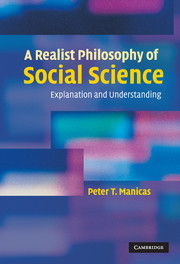Book contents
- Frontmatter
- Contents
- Acknowledgements
- Introduction
- 1 Explanation and understanding
- 2 Theory, experiment and the metaphysics of Laplace
- 3 Explanation and understanding in the social sciences
- 4 Agents and generative social mechanisms
- 5 Social science and history
- 6 Markets as social mechanisms
- Appendix A The limits of multiple regression
- Appendix B Comparison, Mill's methods and narrative
- Appendix C Rational choice theory and historical sociology
- Appendix D The neo-classical model
- References
- Index
Appendix C - Rational choice theory and historical sociology
Published online by Cambridge University Press: 12 November 2009
- Frontmatter
- Contents
- Acknowledgements
- Introduction
- 1 Explanation and understanding
- 2 Theory, experiment and the metaphysics of Laplace
- 3 Explanation and understanding in the social sciences
- 4 Agents and generative social mechanisms
- 5 Social science and history
- 6 Markets as social mechanisms
- Appendix A The limits of multiple regression
- Appendix B Comparison, Mill's methods and narrative
- Appendix C Rational choice theory and historical sociology
- Appendix D The neo-classical model
- References
- Index
Summary
Rational choice theory (RCT) has become an important part of the debate not only in general sociology but in historical sociology in particular. This appendix picks up on several themes of previous chapters and in terms of them examines a very recent and lively debate, occurring both in the pages of The American Journal of Sociology (AJS) and in a recently edited volume. This will, hopefully, both sharpen the issues and provide further evidence of the pervasive legacy of empiricist philosophy of science.
The AJS debate: realism and causality
Craig Calhoun (1998) notes correctly that a key point of difference between this debate and the earlier debates is agreement by the contending parties on the centrality of causal explanations in historical sociology, and, in particular, the acceptance of “the more recently fashionable label of ‘realist’ philosophy of science” (1998: 847). There are two critical questions here.
In this debate, in marked contrast to earlier ones, no one on the panel defends what Skocpol called “interpretative historical sociology.” In their 1991 essay, Kiser and Hector had asserted that there is “wide agreement … across social science that causality is the first requirement of an adequate explanation” (1991: 4). This is a highly dubious empirical claim (as noticed by both Somers and Calhoun). It rules out, by fiat, all interpretative sociology, a still important alternate conception of the human sciences.
- Type
- Chapter
- Information
- A Realist Philosophy of Social ScienceExplanation and Understanding, pp. 171 - 185Publisher: Cambridge University PressPrint publication year: 2006

